Meaningful reforms to the Medicare Physician Fee Schedule, expanding access to PT falls screening and prevention, increasing access to pelvic health physical therapy, and expanding locum tenens arrangements under Medicare. These pertinent issues were at the forefront of conversations, as 500 APTA members made their voices heard in Washington D.C. during APTA Capitol Hill Day July 14-15.
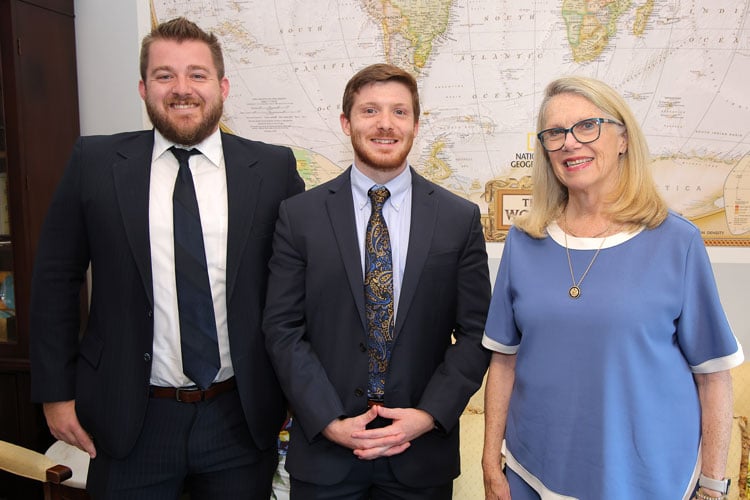 APTA West Virginia members with Rep. Carol Miller.
APTA West Virginia members with Rep. Carol Miller.APTA Capitol Hill Day is a multiday gathering that brings together APTA members from across the country to learn about advocacy and then apply what they've learned during a day of in-person meetings with legislators and staff from the U.S. Senate and House of Representatives.
APTA members attended congressional meetings, with a near-even split between Republican and Democratic offices, plus two Independents. APTA was represented at the event by all 50 states and the District of Columbia.
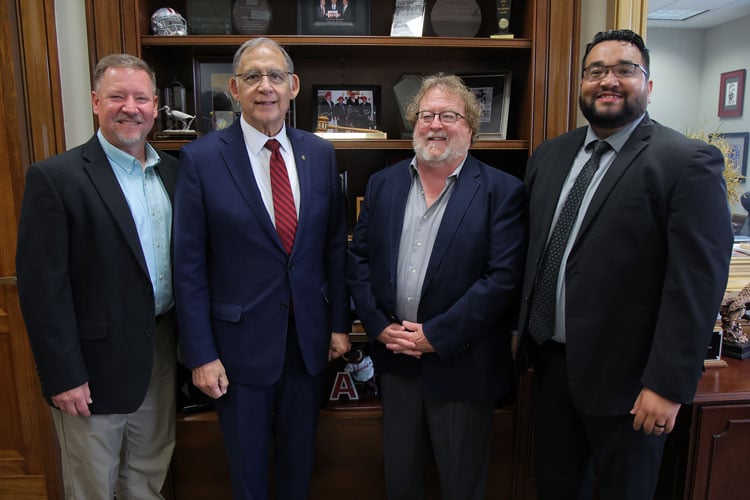 Members from APTA Arkansas with Sen. John Boozman.
Members from APTA Arkansas with Sen. John Boozman. APTA South Dakota Members with Sen. Mike Rounds.
APTA South Dakota Members with Sen. Mike Rounds.
Senators, representatives, and members of their staff were educated on key issues that the physical therapy profession faces. Productive discussions centered around but were not limited to:
- The need for improved payment under Medicare to accurately reflect the cost of practice and ensure timely access to care. This includes addressing the outdated Multiple Procedure Payment Reduction, or MPPR, policy that APTA is advocating to repeal, enacting a permanent annual payment update, and addressing the “budget neutrality” policy, which has triggered automatic cuts to dozens of providers (including PTs) paid under the fee schedule.
- Ensuring continuity of care for patients of physical therapy through The Prevent Interruptions in Physical Therapy Act (H.R. 1517/S. 2225) that would expand the use of locum tenens by PTs under Medicare from just rural and underserved areas to all geographic areas across the country.
-
The importance of pelvic health physical therapy for postpartum women under Medicaid and the Children’s Health Insurance Program by enacting the Optimizing Postpartum Outcomes Act (H.R. 4074)
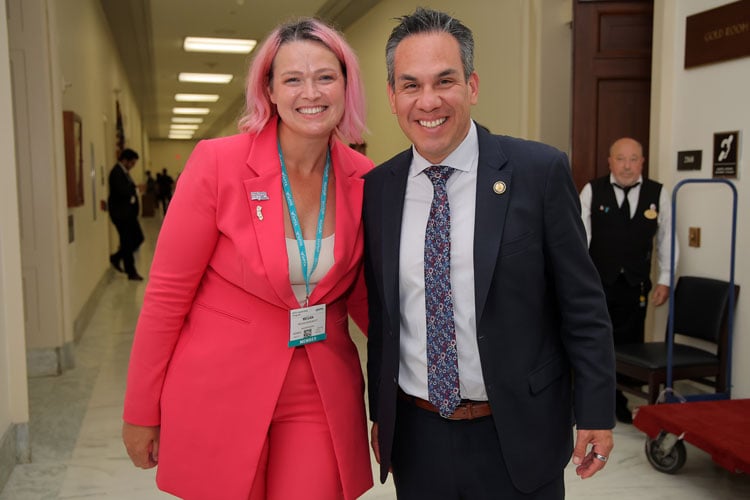 California Physical Therapy Association member Megan Borjan, PT, with Rep. Pete Aguilar.
California Physical Therapy Association member Megan Borjan, PT, with Rep. Pete Aguilar. - Expanding and increasing access to PT falls screenings and services in order to reduce the use of opioids that often occurs as a result of a fall by enacting the SAFE Act (H.R. 1171) that would expand the role of PTs in the “Welcome to Medicare” and “Annual Wellness Visit” under Medicare.
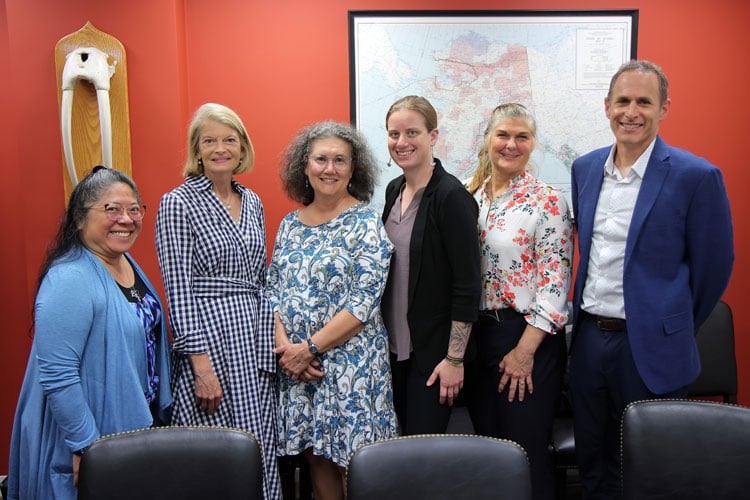 Members from APTA Alaska with Sen. Lisa Murkowski.
Members from APTA Alaska with Sen. Lisa Murkowski.After honing their advocacy strategies and familiarizing themselves with these targeted issues, participants took to Capitol Hill.
Matthew Glassoff, PT, DPT, saw the event as a powerful reminder of what a determined group of advocates can accomplish. “APTA Capitol Hill Day was an inspiring experience that brought advocacy to life. It showed me that physical therapists have a voice in shaping policy — and that APTA is the reason we’re being heard by our nation’s legislators.”
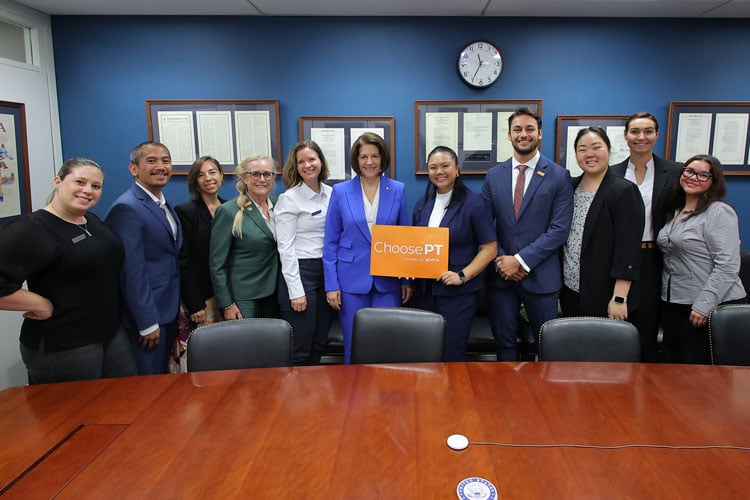 Members from APTA Nevada with Sen. Catherine Cortez Masto.
Members from APTA Nevada with Sen. Catherine Cortez Masto.An APTA Federal Affairs Liaison from APTA Wyoming, Katie Adams, PT, DPT, CSCS, echoed a similar sentiment. “I really enjoyed my first Capitol Hill Day. As a private practice owner from the western part of the United States, these issues are close to home, but the solution can feel far away. Having the opportunity to meet with our senators and House representatives in person made me realize how we can have influence on critical legislative decisions that make a big difference for our profession and for our patients.”
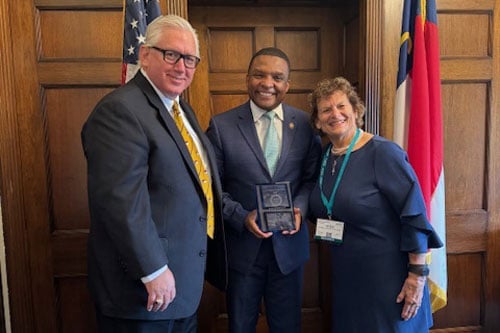 APTA North Carolina members with Rep. Don Davis.
APTA North Carolina members with Rep. Don Davis.This year’s event may be over, but APTA's advocacy efforts never stop. With the August congressional recess in full swing, it’s a great time to continue to fight. If you’re interested in learning how to connect with members of Congress, check out this recent APTA Magazine article.
Members can keep up with the association's advocacy work by signing up for the APTA Advocacy Network, a free, member-only service that sends you special legislative updates and action alerts so you're up to speed and ready to act. It's a great way to get involved — and maybe even get inspired to attend the 2026 APTA Capitol Hill Day.
